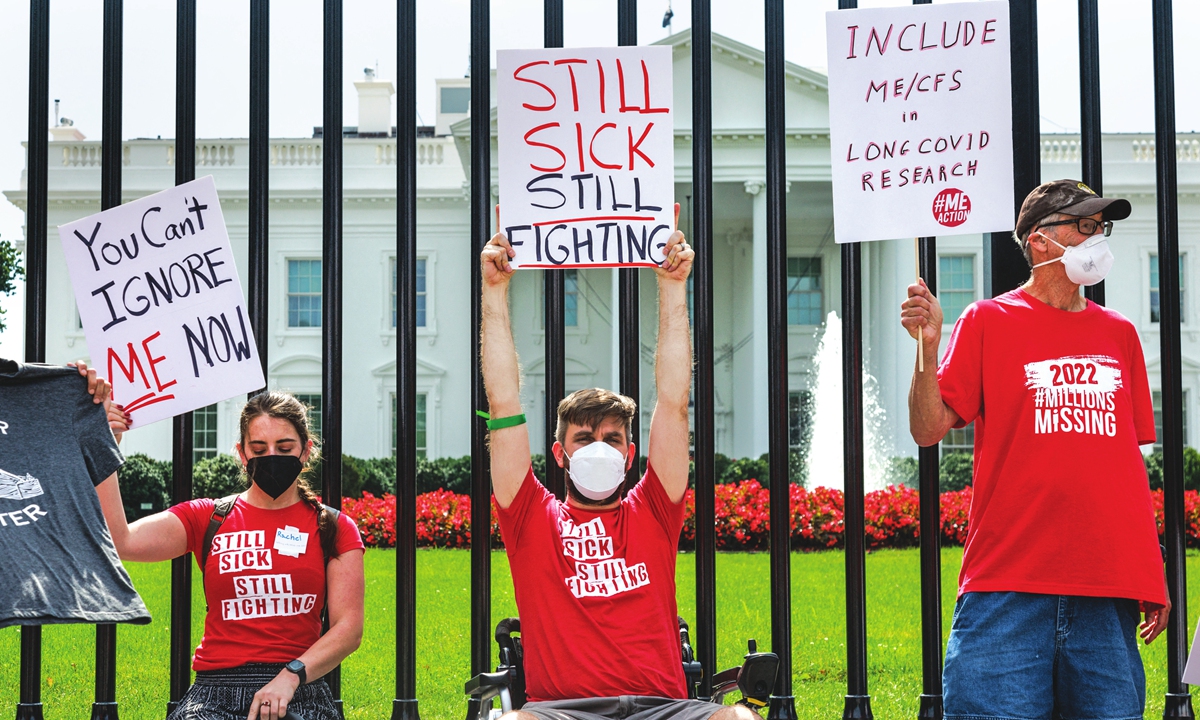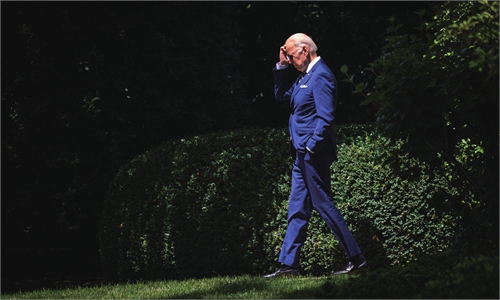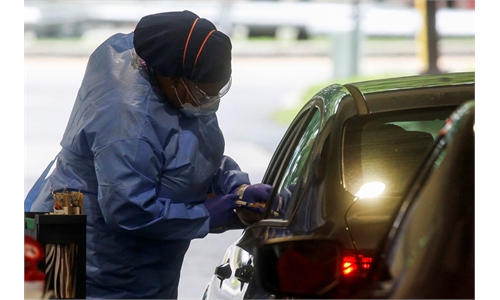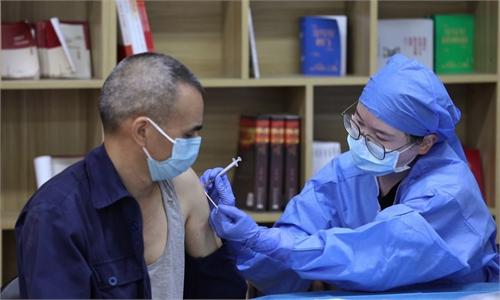
Demonstrators gather outside of the White House on September 19, 2022 to call for urgent governmental action for the millions of people living with long-term COVID, and other infection-associated, complex-chronic diseases. Photo: AFP
Despite that some positive signs have emerged from the three-year global fight against the COVID-19 pandemic as the WHO claimed that "we are in a better position than ever before," the pandemic is not over, and greater efforts are needed in addressing the vaccination inequity, testing gap and being well prepared in medical tools for the highly possible new wave in the upcoming winter, officials and experts said.
UN Secretary-General Antonio Guterres said during a meeting at the ongoing UN General Assembly on Friday that encouraging process has been made toward the ending of the COVID-19 pandemic, but he acknowledged that the work still needs to be done to ensure the most vulnerable are protected.
"If we could combine these tools with greater ambition among world leaders, we could end the pandemic this year. But that requires closing three major gaps," the UN chief told the meeting.
Those gaps include the vaccine booster coverage as the rate remains low everywhere and in low-income countries, only 31 percent of older populations are fully vaccinated and boosted, and the testing gap. Testing rates are plummeting everywhere exposing the world to potential variants and undermining the rollout of new treatments, he said.
Along with Guterres, Tedros Adhanom Ghebreyesus, head of World Health Organization (WHO), also delivered some encouraging messages by saying that the world "has never been in a better position to end COVID-19 as a global health emergency," as many people are vaccinated, and reported deaths from the virus has hit the lowest level since the beginning of the pandemic. But he clarified that "being able to see the end, doesn't mean we are at the end."
"We have spent two and a half years in a long, dark tunnel and we're just beginning to glimpse the light at the end of that tunnel, but it is still a long way off and the tunnel is still dark with many obstacles that could trip us up if we don't take care," Tedros said.
Such cautious attitude toward the end of the pandemic strikes a sharp contrast to the US President Joe Biden recently declaring the "pandemic is over," which drew waves of backlash as such an irresponsible claim showed that the COVID-19 handling has become a political tool for partisan battle in the US.
In comparison, China has been one of the role models in implementing WHO's instructions on fighting the pandemic, as the country's regular prevention and control measures such as tracing the virus and nucleic acid testing are in line with the UN health body's call, providing the world a strong example in containing, as quickly as possible, a rapidly spreading virus such as Omicron.
"Having both anti-epidemic tools and political determinations are important to help us reach the end of the pandemic, but I don't think countries have such determinations as many countries have the immunity gaps," Chen Xi, an assistant professor of public health at Yale University, told the Global Times on Saturday.
Countries like the US and China see the vaccination rates among their elderly people relatively low, and the latest statistics showed that two-third of the world's countries have not met targets to vaccinate 70 percent of their population against COVID-19, which means we still have a long way to go to reach the full immunity, Chen said.
An official at the EU's drugs regulator recently said that the COVID-19 pandemic was not over, contradicting Biden's claim. The regulator stressed that a planned vaccination campaign in Europe during the upcoming cold season was key to fighting the outbreak, Reuters reported on Tuesday.
If rich nations think the pandemic is over, they should help lower-income countries reach that point too, a senior WHO official was quoted as saying in a report by Reuters on Friday.
"If you go to sleep right now and this wave hits us in three months ... God [you've] blood on your hands," WHO senior adviser Bruce Aylward warned, adding that the rich nations must not step back from tackling COVID-19 as a global problem now, ahead of future potential waves of infections.
Experts of the Chinese Center for Disease Control and Prevention (Chinese CDC) also hold a cautiously positive attitude toward the end of the pandemic, as although the hope for overcoming it is in sight, greater efforts are needed in carrying on the anti-epidemic measures.
Wu Zunyou, chief epidemiologist of the Chinese CDC, said in a Weibo post on Friday that if everyone focuses on the first half of what Tedros said and ignores the second half, it's difficult to turn the victory of fighting the pandemic into a reality. Only when countries continue working hard in carrying out prevention and control measures, the end of pandemic could come soon.
Wu also laid out three possible scenarios for the outbreaks during this winter. First, the overall situation continues improving but it's unlikely the pandemic will end this winter. The second scenario - with 30 to 50 percent of chance to happen - indicates that the new infections fluctuate from 30,000 to 50,000 every week with the new deaths from 10,000 to 20,000.
And the most likely scenario is that the sixth wave of the pandemic might occur as early as in this winter, as the current epidemic situation is still at a high level, with people gathering and movement, in addition to the cold environment, there could be a new wave. Also, the possibility of a new mutation strain can't be ruled out, Wu said.
Some countries and regions have been introducing the new quarantine measures in the hope of striking a balance between anti-epidemic efforts and the economy, however, some said the adjustment does not mean governments should drop the guard against the COVID-19.
After Hong Kong introduced the quarantine measures "0+3" for inbound travelers and granting entry to unvaccinated Hong Kong residents, John Lee, the Chief Executive of the Hong Kong Special Administrative Region (HKSAR), said at a press conference on Friday that this is not "lying flat" as the number of infections has to be under control in order to ensure the capacity of the medical system.
"Besides the COVID-19 pandemic, the flu is obviously becoming more serious than before … And the 'Twindemic' could happen as influenza and COVID could be combined this winter," Chen said.




